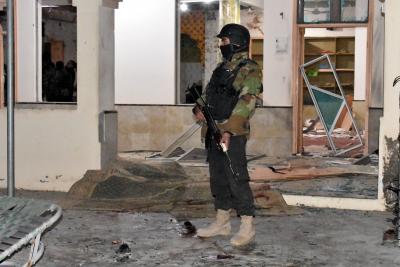Pakistan using jihadist proxies to suppress political dissent: Report
By IANS | Updated: September 9, 2025 20:55 IST2025-09-09T20:53:16+5:302025-09-09T20:55:13+5:30
Islamabad, Sep 9 The recent suicide bombing outside Quetta's Shahwani Stadium claimed by the Islamic State Khorasan Province ...

Pakistan using jihadist proxies to suppress political dissent: Report
Islamabad, Sep 9 The recent suicide bombing outside Quetta's Shahwani Stadium claimed by the Islamic State Khorasan Province (ISKP) underscored Pakistan's broader strategy of using jihadist proxies to suppress political dissent at home while painting itself as a victim of terror on the global stage, a report cited on Tuesday.
Last week, ISKP, an offshoot of the terrorist organisation Daesh notorious for targetting religious sites and security convoys, targetted a nationalist political gathering in Balochistan's capital Quetta.
The suicide bombing on September 2, hours after the Balochistan National Party-Mengal (BNP-M) rally concluded, killed 15 people and injured 32 others.
"Daesh on its own doesn’t usually strike political meetings in Balochistan. Someone wanted this message sent," leading Pakistani daily Dawn quoted a Quetta-based analyst as saying.
"The Quetta blast, tied to politics this time, only deepens concern that Pakistan cannot control its own backyard. For Tehran, still reeling from ISKP’s Kerman bombing earlier this year, the attack suggests militants operate across the border with ease," the report detailed.
It stressed that this is not the first instance such suspicions have emerged regarding Pakistan.
In his book 'Descent into Chaos', Pakistani journalist Ahmed Rashid mentioned that after 2001, Pakistan’s Inter-Services Intelligence (ISI) positioned itself as a counter-terror ally of Washington and simultaneously sheltered Taliban fighters by nurturing groups like Lashkar-e-Taiba.
Noted American political scientist C Christine Fair has described this contradictory policy as fighting some terrorists while backing others.
"This kind of ‘calibrated violence’ has been noted before in Pakistan. The Centre for Research and Security Studies, in its 2024 annual report, warned that Islamabad increasingly uses federally-backed paramilitaries and proxies to manage dissent in provinces. The Quetta bombing appears to follow the same model, only with ISKP as the tool," the report detailed.
It further noted that Baloch armed groups are already hinting at retaliation. Addressing reporters, a spokesperson for the Baloch Liberation Army (BLA) said that the attack demonstrated how Islamabad uses Daesh against our people.
The report highlighted that security officials privately fear a potential surge in ambushes targetting Pakistani troops in Quetta, Gwadar, and along the China–Pakistan Economic Corridor (CPEC) routes.
Analysts slammed the condemnations of the suicide attack by Pakistani Prime Minister Shehbaz Sharif and President Asif Ali Zardari, describing their words as hollow.
"You cannot claim to fight extremism while keeping extremists as your tools," Dawn quoted one of its columnists as saying.
Disclaimer: This post has been auto-published from an agency feed without any modifications to the text and has not been reviewed by an editor
Open in app